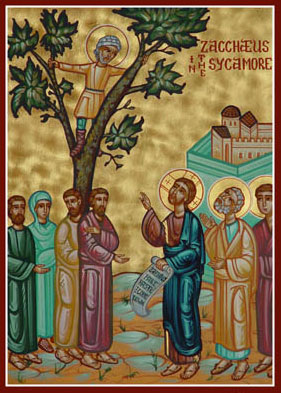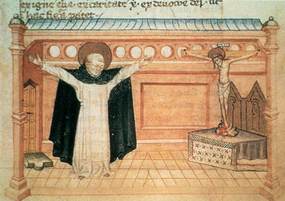Category: Spiritual Life
Faith in Christ’s Divine Merits
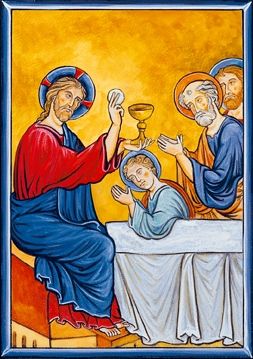 Some friends and I at the parish have been reading a series of Pope Benedict’s homilies on the Eucharist taken from his book, God is Near Us. I recommend paying attention to every page of this small collection of Benedict’s. Reading through some meditations of Blessed Columba Marmion, the famed Benedictine monk and spiritual master struck me. He wrote,
Some friends and I at the parish have been reading a series of Pope Benedict’s homilies on the Eucharist taken from his book, God is Near Us. I recommend paying attention to every page of this small collection of Benedict’s. Reading through some meditations of Blessed Columba Marmion, the famed Benedictine monk and spiritual master struck me. He wrote,
Prayer: raising one’s heart and mind to God
 It would be a pity to forget last Sunday’s first
It would be a pity to forget last Sunday’s first
reading where we read of Moses’ role as mediator of God’s saving plan.
book of Exodus we were reminded that Moses had concern for the salvation of his
unbelieving countrymen, and therefore he asked that God show His compassion
towards sinful Israel (see Exodus 32-34). The raising of Moses’ hands in
prayer, while dramatic, is not a biblical example of a magical Wizard of Oz. It is, however, a posture that invites all of us to pray using our God-given body and as a group as it is more effective in
expanding our own heart for God’s grace and power.
as it is given to us in the Catechism of the Catholic Church cites Saint John
Damascene’s definition of prayer as “…the raising of one’s mind and heart to
God or the requesting of good things from God.” The Catechism speaks of
biblical types of prayer, such as ‘the prayer of Moses [that] responds to the
living God’s initiative for the salvation of His people. It foreshadows the
prayer of intercession of the unique mediator, Christ Jesus’ (2593).
raise our hands in prayer? What posture of prayer do we use? Do we use our body in praying? Are you too stiff and scared in your manner of praying?
the “Nine Ways of Prayer” given to us by Saint Dominic de Guzman is the raising
of hands in prayer. The 6th and 7th Ways of Prayer are directly connected with the living of the Beatitudes and the spirituality of the Cross. Outstretched hands in the form of a cross became a familiar way of praying for Saint Dominic (and his followers) that he believed was inspired by God not only at Mass but also when he was praying for someone’s healing or being being raised from the dead.
Capuchins Open Center in Jerusalem
The Order of
Capuchin Friars Minor opened a center for spirituality and formation for
religious and laypeople who want to attend courses and retreats in that region.
The center, which is inspired by the motto, “I am the light of the
world,” was inaugurated 28 September 2010.
At the inauguration ceremony,
Archbishop Fouad Twal, Latin patriarch of Jerusalem, noted that this light is
the witness that believers make to those around them. He added that this idea
“is a topic of our next synod,” which will take place in Rome,
beginning Sunday, and will focus on the Middle East.
“In Jerusalem, we can
count on hundreds of religious congregations, 14 of which are contemplative
communities,” the prelate said. “They are the strength and richness
of the Latin Catholic Church.” He continued: “Today we inaugurate a
new center for spirituality and welcome, thanks to the goodwill of our beloved
Capuchins, a center called to be light.” “True Christians influence
the world around them and reflect the light of the Lord,” the archbishop
affirmed.
The property where the center is located belonged to the Capuchin
order since the 1930’s, when Archbishop Luigi Barlassina invited the religious
to build a convent in the Jewish area of Jerusalem.
However, the friars had to
leave Jerusalem during World War II, putting the project on hold. The property
was taken over by the state for a psychiatric hospital. The Capuchin center
project was later revived in the 1990’s.
Present at the inauguration ceremony
were: Fr. Mauro Jöhri, Capuchin General Minister and the entire Definitory; His
Beatitude, Archbishop. Fouad Twal, Latin Patriarch of Jerusalem; Archbishop
Antonio Franco, Apostolic Delegate in Jerusalem and Apostolic Nuncio in Israel;
Fr. Pierbattista Pizzaballa, OFM, Custos of the Holy Land; Bishop
Francesco Beschi, Bishop of Bergamo; the Capuchin Order’s Legal Representative,
the General Bursar, the Capuchin Provincial Minister of Venice, other
Franciscan Provincials.
The renovation was made possible by a number of
benefactors, with a considerable contribution from the Cariplo Foundation.
A photo
journal of the center’s dedication is here.
The Latin Patriarch of
Jerusalem posted a story on
the center.
Zenit carried a story on this center.
(this
story is reposted and edited from Capuchin Newsnotes, 13 October 2010)
Sacrament of Mercy Conference
A friend, the Rev’d Canon Matthew R. Mauriello, has organized the forthcoming Conference on the Sacrament of Mercy to be held in Milwaukee, 8-9 October. There are several excellent speakers to note.
From whom do you take counsel?
The reading at Lauds this morning was from Sirach 8. You’ll recall that the Book of Sirach is also called the Liber Ecclesiasticus (that is, the “church book”) because of its wide use in catechetics and in the sacred Liturgy. There is nothing in Sirach that is not applicable to us today! Monks, nuns, priests and laity who do the Office of Readings will read the entire book in the course of 2-3 weeks. As a point of comparison, Sirach is one of those books that Protestants do not include in their version of the Bible; Catholics consider Sirach to be both inspired and canonical and worthy of prayer and meditation.
In general one may say that the author Sirach is concerned with interfacing of all parts of our lives: family, friendship, economy, politics, worship, good public order, etc. The Catholic term here would be communio, while the Protestants are inclined to use the concept of fellowship, but to be fair at today’s writing, Catholics use the word “fellowship” in the Liturgy and that is mistaken. For the Catholic, communio is not merely the horizontal relationship with sisters and brothers –mere humanitarianism– but first communion (relationship) with the Blessed Trinity and then communion with sister and brother. Communion with the Trinity and with neighbor leads to one’s greater freedom (think of Msgr Giussani’s work in Communion & Liberation movement). To take this idea one step further, there is no hard separation between communion with the Trinity and neighbor. Catholics hold fast to the both/and of reality: we are to live in communion with the Trinity, basing our life analogously on the inner life of the Trinity and serving our sister and brother. Saint Benedict in his Rule shows us this is the way to God. What struck me today was the question: To whom do we go for counsel? How do I live in a more perfect freedom with the Trinity and my neighbor? In what ways do I serve the Lord well? How have I looked with tenderness on my humanity, and that of others?
Certainly, I have not always been served well by the advice offered by those placed over me. Superiors, whether secular or religious, have not always been too attuned to the Divine Will through prayer, fasting and lectio that their own issues have been the source of counsel rather than the Will of God; I am amazed that I’ve survived as well as I have. In profound ways, I have to say, the people I was told to have confidence in turned out be frauds when it came to working with one’s humanity, discernment of Spirits, the spiritual life, interpersonal relationships, ecclesial politics, etc. After praying on what Sirach has to say today, I wonder if we as members of the Body of Christ have paid too little attention to the Wisdom literature of the Bible.
Jesus, son of Eleazar, son of Sirach writes:
Contend not with an influential man, lest you fall into his power. Quarrel not with a rich man, lest he pay out the price of your downfall; For gold has dazzled many, and perverts the character of princes. Dispute not with a man of railing speech, heap no wood upon his fire. Be not too familiar with an unruly man, lest he speak ill of your forebears. Shame not a repentant sinner; remember, we all are guilty. Insult no man when he is old, for some of us, too, will grow old. Rejoice not when a man dies; remember, we are all to die. Spurn not the discourse of the wise, but acquaint yourself with their proverbs; From them you will acquire the training to serve in the presence of princes. Reject not the tradition of old men which they have learned from their fathers; From it you will obtain the knowledge how to answer in time of need. Kindle not the coals of a sinner, lest you be consumed in his flaming fire. Let not the impious man intimidate you; it will set him in ambush against you. Lend not to one more powerful than yourself; and whatever you lend, count it as lost. Go not surety beyond your means; think any pledge a debt you must pay. Contend not at law with a judge, for he will settle it according to his whim. Travel not with a ruthless man, lest he weigh you down with calamity; For he will go his own way straight, and through his folly you will perish with him. Provoke no quarrel with a quick-tempered man, nor ride with him through the desert, For bloodshed is nothing to him; when there is no one to help you, he will destroy you. Take no counsel with a fool, for he can keep nothing to himself. Before a stranger do nothing that should be kept secret, for you know not what it will engender. Open your heart to no man, and banish not your happiness (Sirach 8).
Holiness is a disposition of the heart
Christian hope is not based on personal merit, nor
upon good works, nor good intentions, for all these are too transitory, and too
utterly disproportionate to the attainment of God; rather, our hope is based
upon God himself, upon Christ the one Mediator and Savior.
become rashness, it must obviously be accompanied by personal effort and
diligence; still we must be convinced that all our good will and good works are
always insufficient; only God can sanctify us, only God can raise us up to himself
and give us himself as our possession. Only God, the object of our hope, is
also the support of hope, its buttress, its fulcrum.
Therese of the Child Jesus wrote: Sanctity does not consist in this or that
practice; it consists in a disposition of the heart which make us humble and
little in the arms of God, conscious of our weakness, and confident to the
point of audacity in the goodness of our Father (Novissima Verba, pg. 29).
Intimacy
Arrupe’s prayer for collaborating with Christ
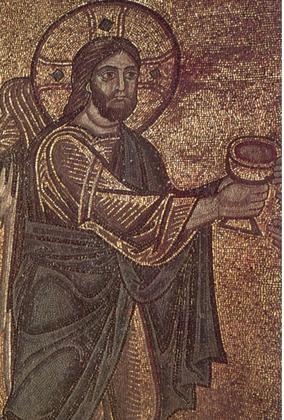 Lord, meditating on our way of proceeding, I have discovered that the ideal of our way of acting is your way of acting.
Lord, meditating on our way of proceeding, I have discovered that the ideal of our way of acting is your way of acting.
Assumption/Dormition fast
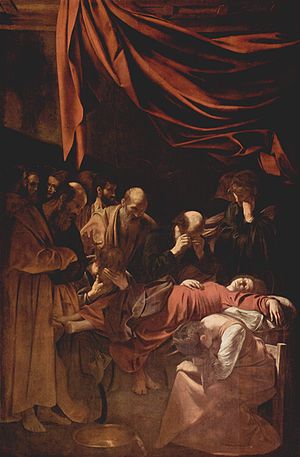 Those Christians who are not Orthodox –as in, Orthodox Christians or Eastern Orthodox or some version of this– are likely not to be aware that today begins the traditional time of fasting in preparation for the great feast of the of the Assumption (if you are Catholic) or Dormition (if you are Orthodox) of the Blessed Virgin Mary (Theotokos), the all-holy Mother of God. In fact, the Churches of East and West are called upon to prepare for the yearly festival of our Lady by prayer, fasting and almsgiving. Sound familiar? Indeed, the 3-point spiritual discipline is identical with Lent and Advent.
Those Christians who are not Orthodox –as in, Orthodox Christians or Eastern Orthodox or some version of this– are likely not to be aware that today begins the traditional time of fasting in preparation for the great feast of the of the Assumption (if you are Catholic) or Dormition (if you are Orthodox) of the Blessed Virgin Mary (Theotokos), the all-holy Mother of God. In fact, the Churches of East and West are called upon to prepare for the yearly festival of our Lady by prayer, fasting and almsgiving. Sound familiar? Indeed, the 3-point spiritual discipline is identical with Lent and Advent.
On the 18th Sunday through the year
 Vanity of vanities! All things are vanity!
Vanity of vanities! All things are vanity!
All our striving and our toil are things we leave behind!
Each day and night we strive, we work
And still at the end will die:
If today you shall hear the voice of the Lord,
Then attend God’s gracious word!
Greed in all its forms brings death, and things cannot give life.
Fools are we to grow rich for self and not grow rich with God!
“Eat, drink, be merry,” calls the world,
And still at the end we die:
If today you shall hear the voice of the Lord,
Then attend God’s gracious word!
Raised up now with Christ from death, we set our hearts on high;
Hidden now with Christ is our life, to glory we shall rise!
Fix now our hearts on things above,
Yes, even though we die:
If today you shall hear the voice of the Lord,
Then attend God’s gracious word!
